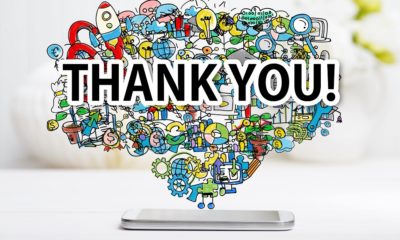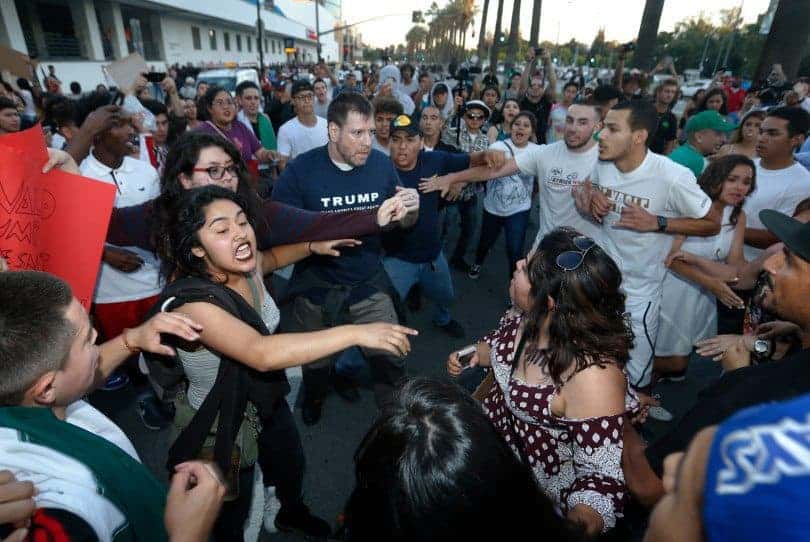4 Things to Do If The 2016 Election Results Has You Feeling Sad and Disappointed
Watching the results refresh on smartphone screen —the news seemed to oscillate between hopeful and nail-biting.
It’s difficult to describe how I’m feeling, at the moment.
Like many others who voted for Clinton, rather than Trump, I feel genuine shock that this is the tragic outcome we now face.
I don’t understand it.
Rather than focus on my own disappointment, however, I intend to work with and for forces that are good and true in the world.
Although those abstractions are relative concepts, more than one person has hypothesized that this vote seems indicative of a ‘white-lash’: that is, a backlash against non-white minorities; or a sign of resentment that is prevalent among the far or alt-right.
If these malignant forces scare you, too, I encourage you to get involved with organizations and movements that fight against them.
There are nonprofit organizations that support or represent a number of causes, including independent media, civil liberties, sustainability and clean energy, education, and social justice.
Here are four suggestions for actions to take, post-Election Day.
Sustainability as Social Justice
According to Case Western Reserve University’s Social Work program, sustainability is the social justice issue of the new century.
It has become increasingly clear that the widening gap between the ‘haves’ and the ‘have-nots’ is intricately related to quality of life; and one’s quality of life is inevitably connected to one’s access to clean water, air, and food.
Because we should all ideally have the right to basic natural resources—but not all of us do—these issues have become the focus of environmental lawyers and law specialists, nonprofit business owners, politicians, healthcare professionals, and social workers.
A major part of environmental law, for example, is tackling lawsuits involving companies whose products are harmful to people’s physical health as well as the environment.
In contrast, Women of Green—based out of Santa Fe, New Mexico—aims to bring together business women concerned with sustainability and social justice.
Part of that concern with sustainability is a prime focus of the entrepreneurs and small business owners who are concerned about healthy living, since there are currently few laws in place that effectively prevent companies from manufacturing products that are toxic and environmentally unsound.
Local Agriculture and Food Sourcing
One of the most important movements we can get behind for the sake of our local economies and communities is our local food movement: small farmers and CSAs help sustain our health, our vitality, and our sense of connection to the natural world we live in.
Supporting local food production—as well as taking the time to learn how to save seeds and grow food, ourselves—brings us one step closer to self-sufficiency and helps us be less dependent upon big agriculture and unsustainable food production practices.
Plus, community gardens and sharing our bounty with neighbors a la Victory Gardens provide ways to develop and nurture community connectedness—something which is sorely lacking from our current political climate.
To give you an idea of the specific food-related issues of interest to people, at the moment, Sustainable Agriculture and Food Systems Funders (SAFSF) recently conducted a survey that listed five top concerns: local/regional food infrastructure; food access; policy at the local/state/tribal level; equity and social justice; and environmental protection.
Although individual grant organizations or foundations sometimes have difficulty making permanent systemic changes, when these groups join forces, they’re more likely to effect change.
In an article from Open Democracy, Anna Coote argues that social justice and environmental sustainability are not two separate goals; but rather, they depend on each other and should be linked at a federal level:
At a national level, states that support a collective ethos not only tend to have stronger traditions of shared welfare and commitment to social justice, but are also better able to deal with the need to mitigate environmental damage and cope with its consequences.
Think about the situation with the Dakota Access Pipeline, at the moment.
North Dakota seems to be notably behind more progressive states like Oregon or California, in terms of espousing a philosophy that values native peoples, local farmers, and community supported agriculture (CSAs).
Of course, many farms still have a long way to go toward reform of farm workers’ rights—all the more reason to support the efforts of sustainable agriculture by buying local produce or joining a CSA.
In addition, don’t forget to put pressure on local officials and vote representatives into office that represent humanitarian values—which brings us to number three.
Political Organizing & Involvement
You can’t influence politics unless you get involved in the political process.
That observation might seem obvious, but considering the number of conspiracy theories out there about unseen political forces with almost omniscient power, it seems like an important reminder of the necessity and enormous responsibility of the democratic process.
Each of us has a responsibility to participate in our democracy by voting, even if the forces working against us sometimes feel insurmountable.
If voting doesn’t feel like enough, you could always make politics into a full-time career.
People with an educational background in political science or political management might consider a position as a city planner, political organizer, lobbyist, social worker, or archivist.
The government and the nonprofit sectors are both excellent outlets for politically-minded individuals hoping to make a difference in their communities as well as society-at-large.
Education & Critical Thinking Advocacy
In addition to all the long-term suggestions, above, I also recommend talking to your friends, family, neighbors, and community members.
We need more understanding and empathy in the world, now—not less.
We must demonstrate and advocate for critical thinking, education, and rationalism, at all costs.
This means not only speaking with those who agree with you, but also engaging in difficult and sometimes unpleasant conversations with those with whom you disagree, as well.
One of the topics worth discussing is rationalism: that is, the use of logic and critical thinking to formulate and defend opinions.
One of the saddest and most disturbing aspects of this election is the apparent absence of critical thinking that went into all the votes for Trump: how, precisely, is an advocate of trickle-down economics—an approach that’s proven itself to be utterly disastrous for all but the very affluent—going to heal the economy?
How is a person with utter disregard and knee-jerk contempt for anyone who disagrees with him ever going to successfully negotiate peace treaties and other serious foreign policy issues with world leaders?
This encouragement of rationalism requires not only an espousal of reading and education, but also a willingness to call out untruths and half-truths, false bias, and prejudice whenever we see it—and if this causes us to be temporarily uncomfortable, compare that momentary inconvenience to real harassment, subjugation, and violence.
Although the mood, for many of us, is still somber, we must remember that each of us has the ability to be a positive influence in the world, and that we all have some agency.
We must exercise our free will and resist surrendering to apathy, resignation, or fear.
We must “Think globally, act locally,” as the expression goes—and this applies as much to the general election as it does to globalization and climate change.
If you are among the millions who feel disenfranchised, today, I stand in solidarity with you in your frustration.
However, I also urge you to find the strength to channel that righteous anger into actions that contribute to solutions, rather than fuel for useless fires.











